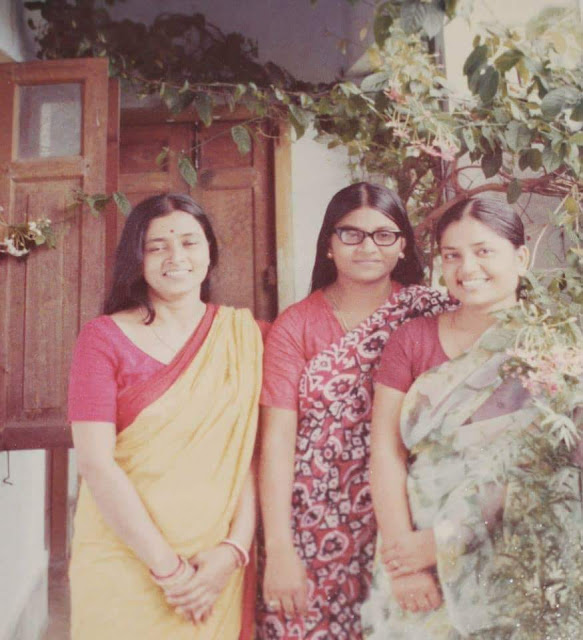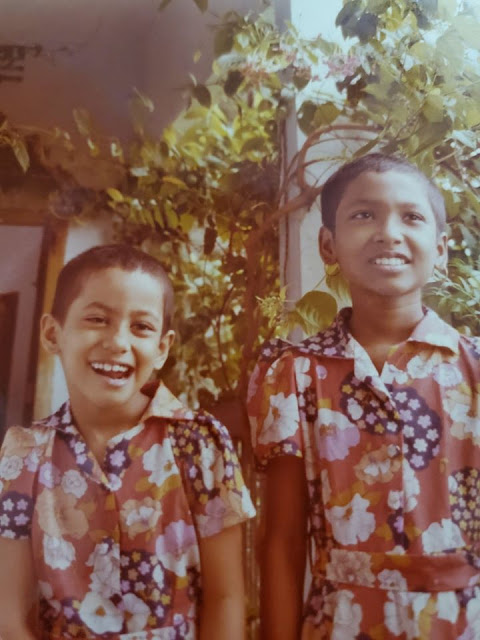Summer vacation
It is always like this.
My middle aunt Kunkima and my cousins Joy, Shuvo, and Moutushi have been staying with us in Rajshahi. My uncle Anil mesho has just come from Dhaka to visit his wife and children, and to spend time with us. It is summer vacation. Normally, we stay with our extended family in Dhaka, or they come to Rajshahi for the whole summer.
While we little ones are destined to stay on the living room floor, Kunkima and my Anil mesho have been given the master bedroom, which has my grandmother and grandfather’s wedding bed. It is a beautiful bed made of Burma teak wood.
---
Growing up, we did not have very expensive furniture in our house. I always used to look at this wedding bed with awe, admiring the black matte finishing, and ornate headstand and foot stand. Normally my mom and I used to sleep there. While growing up in Bangladesh I saw very few people who were lucky enough to have a room or bed all to themselves. Most of my friends used to share with their sisters, aunts, or grandmothers, while boys used to share with their brothers, uncles, or grandfathers.
When relatives or guests came to our house, we gave them the master bedroom, with its beautiful Burma teak bed. Relatives and guests were always given the best room with the best bed, and special food was made and served to them. Most of the time, we had lots of people in our house: my mom, my sister, my grandparents, my aunt, my mom’s cousin, and my grandfather’s cousin lived with us. Sometimes friends, relatives, friends’ friends and acquaintances from our ancestral village came to stay.
 |
| Rajshahi house verandah: My mom and my two aunts |
 |
| Rajshahi house roof: Me, my grandfather, my grandmother, my sister Shyama, and my cousins Joy and Shuvo |
While growing up, I noticed everybody in our house always eagerly awaited for guests to arrive. Nobody ever asked them when they were going to leave, as that was never the etiquette. Most of my friends’ houses were also this way. Nobody ever questioned these arrangements, as this was the norm. In Bangladeshi culture, guests are considered as blessings from God.
We used to live on the Rajshahi University Campus, since my mom used to teach at the University. The professor’s quarters were quite big, but not big enough to accommodate all the guests; we did not have that many rooms or beds. But so what? There was always the comfort of the floor!
When I became an adult, I thought a lot about the sleeping arrangements we made on the floor. I felt that the children who slept on the floor regularly turned out to be more selfless. From very early on they learned to share whatever they had with others.
Perhaps I think this way because I had to sleep on the floor!
---
It is very hot this year. Rajshahi is famous for its high temperatures. My aunts have spread these woven mats on top of the mattresses on the floor. The fibers are very cool and soothing to lie on. Still, we are sweltering from the heat. The windows are wooden, as they insulate better than glass. At the top of the windows, there are small glass squares, painted green to protect us from the blistering heat. Buckets full of water are kept on the floors in every room, in the hope that the water will evaporate and cool down the room. During the day, all the floors are wiped with water at least twice. In my childhood, I did not know anybody who had AC in their house.
It is so hot that nobody can go out during the day. They wait for dusk when the earth cools down quite a bit. It is at this magical time when Jasmine and Gardenia start blooming. I think to myself, if just for the beautiful and fragrant Gardenias, I do not mind being alive during the summer months of Rajshahi.
At noon, during these terrifying summer months, a salesman comes to haunt our streets. He screams at the top of his voice through a funnel-shaped tube, “Come, come, here I have your digestive pills. It kills cockroaches, it kills spiders, it kills all dysenteries, and here I have your digestive pills.’
These used to look and taste more like black, tamarind pickles; not pills at all! They were beyond tasty. Amongst my cousins, none of us had any kind of dysentery. But we used to crave for these digestive pills: to be able to taste the sweet tang and lick ones fingers always sounded so heavenly. But my youngest aunt was like a health minister, always looking out for our good health. One of her laws was that we always had to eat homemade food. I cannot remember whether in my childhood, we have ever eaten any outside food or not. I think we did not.
I still remember how much we used to long for those green-colored ice-creams. Technically, they were not ice-creams really, they were colored popsicles. But back then, milk and cream were expensive, and when you are a child you really do not mind calling the caterpillar a butterfly. On those quiet summer afternoons, the ice-cream carts drove past our house, their bells ringing out with alluring ‘tung-tang’ sounds. Mourning doves sang their sorrowful songs as we watched the ice-cream man leave, leaving us without a single ice-cream. My aunt used to believe that the ice-cream man was making those popsicles from dirty drain water. My cousins Joy and Shuvo used to tell us, ‘Don’t be sad, Didivai, Rangadi. When you come to Dhaka next time, we will take you to the Igloo ice-cream shop. It is not street-food, so nobody will be able to say ‘No’ that time. You will see!’ Among all my cousins, I am the eldest and my sister Shyama is the second in line. So, all my cousins call me ‘Didivai’ – the respected eldest sister. They call Shyama ‘Rangadi’ – the adorable, sweet sister. Listening to my cousins’ wisdom, our mourning ended and we continued playing.
But our misery did not end there. In the afternoon, no fried snacks were ever served to us like at my other friends’ houses. My grandmother normally used to bring another healthy masterpiece. She used to make mango and jackfruit juice with one hand, while holding a hand-fan made from palm leaves, with which she used to drive away the big, blue-copper colored flies. After that, my grandmother used to mix the mango-jackfruit juice with milk and rice. This was our everyday afternoon snack in the summer. Mango and Jackfruits typically signify summer in Bangladesh. Though I am the eldest, I used to fight with my sister and cousins for the cream of the milk. We used to get our milk from the nearby milkman. The concept of pasteurizing milk didn’t exist, so we had to boil our milk at least two times a day. When they boil the milk and keep it for some time, a thin layer of cream accumulates on top of the milk. I was vegan for seven years, and I could do away with my favorite, the spicy goat-meat, but I used to long for that cream of milk. All my life I fought for it, and in my childhood days, my sister and my cousins always used to tell me, “Oh, Didivai, you take the cream of milk, please.”
---
The sky is becoming very dark. Storm clouds are gathering up in the afternoon sky. Strong wind is rising up, signaling that a Nor’wester storm is approaching – it is the KaalBoishakhi. During the summer months in Rajshahi, we withstood the savage winds and violent thunder.
Inside the house, we cousins have started singing in our off-tuned, screechy voice-
‘Storm is here, storm is here
Let the mangoes fall
Green mangoes, ripe mangoes
Sour and sweet
Oh dear, rain has started too...’
Somebody brings out a bowl of green mango slices mixed with spicy mustard sauce, green chilies, and salt. We lick our fingers, almost polishing off a layer of our skin.
---
I am becoming old. These days, when I am awake, I become part of my childhood stories.












Comments
Post a Comment